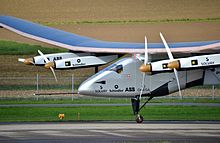World Alliance for Clean Technologies

The World Alliance for Efficient Solutions is a non-governmental organization promoting green energy and sustainable technologies.[1][2]
The organization was announced on 26 July 2016 by André Borschberg and Bertrand Piccard at the completion of their circumnavigation of the globe with the solar-powered aircraft Solar Impulse (at that time named International Committee of Clean Technologies).[3][2] Its launch was confirmed in November 2017.[4]
History[edit]
During the final flight of their circumnavigation of the globe, Borschberg and Piccard announced the creation of a World Alliance for Clean Technologies (later renamed World Alliance for Efficient Solutions). The aim of this non-governmental organization is to promote green energy and sustainable technologies[3][2] by bringing together for-profit companies creating green solutions.[5][6][7]
World Alliance was launched in November 2017.[8] Piccard said that he and his organization, Solar Impulse Foundation, formed the World Alliance to help draw investors' and businesses' attention to new cleantech startups.[9] Piccard does not receive a salary for his leadership of the alliance, which is funded by donors including Air Liquide, Nestle and Solvay.[9]
In November 2017 at COP23, Piccard tasked the World Alliance with a project to identify 1,000 technological solutions that are both profitable and good for the planet, with the goal to bring environmentalists and industrialists together.[5][10] He noted in a 2018 Smithsonian article that technologies developed for the solar-powered flight were already being repurposed in new ways, including new ceiling fans based on the solar airplane engines and refrigerators using the cockpit insulation.[5]
When speaking to government leaders, Piccard said he was consistently told that they wanted to protect the environment but it was too expensive.[11] To provide reassurance, in May 2018 Piccard and the Solar Impulse Foundation announced the Efficient Solutions Label, a certification involving a rigorous Ernst and Young-certified evaluation by independent experts to assess each solution's quality and ability to turn a profit.[9][11][12] According to Piccard, any Solar Impulse labeled solution must be the best in its class: the most environmentally friendly as well as economically viable and available for purchase today.[13]
In 2021 in a Reuters interview, Piccard stated that his organization had assembled a portfolio of 910 vetted and labeled solutions and expected to reach 1000 by mid-April 2021.[13] Piccard told Reuters he plans to discuss the solutions with businesses and governments, especially those in the process of funding the global economic recovery from COVID-19.[13]
Organisation[edit]
During their travel around the world, Borschberg and Piccard brought together about four hundred associations promoting renewable energy.[3][2] As of June 2017, several multinational corporations are members of the Alliance, among which Solvay, historical partner of Solar Impulse, Air Liquide and Engie.[14]
See also[edit]
References[edit]
- ^ "International Committee for Clean Technologies launched from a solar airplane while flying over the Atlantic Ocean", press release of Solar Impulse, 26 July 2016 (page visited on 7 August 2016).
- ^ a b c d (in French) Olivier Dessibourg, "Vers un comité mondial pour les énergies « vertes »", Le temps, Wednesday 27 July 2016, p. 13. Box part of the large article of Fabien Goubet entitled "Un tour du monde, zéro carburant : Solar Impulse réécrit l'histoire de l'aviation", Le temps, Wednesday 27 July 2016, pp. 12–13
- ^ a b c "International Committee for Clean Technologies launched from a solar airplane while flying over the Atlantic Ocean", press release of Solar Impulse, 26 July 2016 (page visited on 7 August 2016).
- ^ Wei-Haas, Maya. "Inside the First Solar-Powered Flight Around the World", Smithsonian magazine, January 31, 2018
- ^ a b c Wei-Haas, Maya (January 31, 2018). "Inside the First Solar-Powered Flight Around the World". Smithsonian Magazine. Retrieved 19 January 2021.
- ^ Piccard, Bertrand (November 11, 2016). "The World Alliance for Clean Technologies was launched by the Solar Impulse Foundation at COP22!". The Solar Impulse Foundation. Retrieved 19 January 2021.
- ^ Page, Tom (October 2, 2020). "Bertrand Piccard: The explorer who wants to clean up the skies, and the rest of the planet". CNN. Cable News Network. Retrieved 18 January 2021.
- ^ Wei-Haas, Maya. "Inside the First Solar-Powered Flight Around the World", Smithsonian magazine, 31 January 2018
- ^ a b c RP, Siegel (June 27, 2018). "Solar plane pioneer embarks on journey to help low-carbon innovations take flight". GreenBiz. Retrieved 16 March 2021.
- ^ Zipp, Kathie (November 15, 2017). "Solar Impulse Foundation launches alliance for efficient solutions". Solar Power World. Retrieved 4 February 2021.
- ^ a b Lebleu, Tristan (May 23, 2018). "The Solar Impulse Efficient Solutions Label: A New Approach to Protect the Environment". Solar Impulse Foundation. Retrieved 16 March 2021.
- ^ Barbiroglio, Emanuela (Nov 25, 2019). "A New Record On A Hydrogen Car Shows Consumers Can Save The Planet". Forbes. Retrieved 16 March 2021.
- ^ a b c Balch, Oliver (February 21, 2021). "Seeking take-off with 1,000 clean tech solutions to fuel the globe". Reuters. Retrieved 23 February 2021.
- ^ Jean-Michel Bezat (15 June 2017). "Engie s'associe au fondateur de Solar Impulse". LeMonde.fr (in French). Retrieved 15 June 2017.
External links[edit]
- Official website
- Scientific Innovations for a Sustainable Future: Solar Impulse Foundation’s World Alliance for Efficient Solutions
